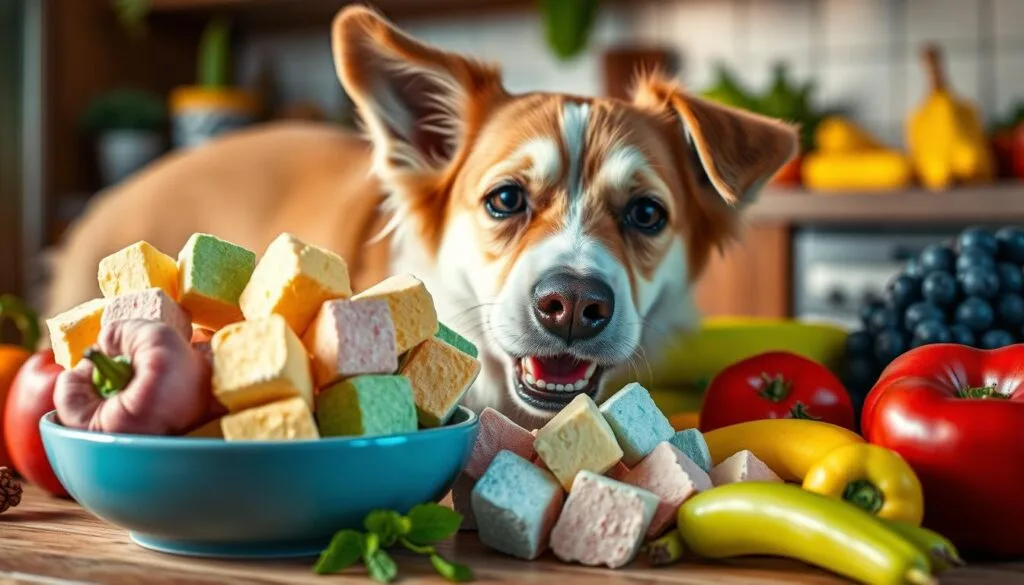As a dog owner, you might wonder if dogs can eat marshmallows. It’s important to know the safe foods for dogs. With more human foods being shared with dogs, understanding the risks and benefits is key.
It’s vital to know if marshmallows are safe for your pet. This ensures their health and happiness. In this article, we’ll dive into the topic of dogs and marshmallows. We’ll give you an overview of what you need to know.
Table of Contents
Understanding the Basics of Marshmallow Composition
Marshmallows are a favorite among humans but can be bad for dogs. It’s key for dog owners to know what’s in regular marshmallows. These treats have sugar, corn syrup, and gelatin, which can harm dogs if eaten too much.
When looking at dog diet marshmallows, the nutritional value matters a lot. Regular marshmallows are full of sugar and calories. This can cause dogs to gain weight and face health problems. Here’s what’s in a regular marshmallow:
| Ingredient | Amount (per 100g) |
|---|---|
| Sugar | 70-80g |
| Corn Syrup | 10-20g |
| Gelatin | 5-10g |
| Calories | 300-400 kcal |
Given the dangers of certain foods for dogs, finding safe alternatives is crucial. Knowing what’s in marshmallows helps dog owners choose better treats. This ensures their pets stay healthy and happy.
Can Dogs Eat Marshmallows: The Simple Answer
Sharing treats with your furry friend is a big responsibility. Can dogs eat marshmallows is a question many pet owners ask. Marshmallows might seem safe, but they can harm your dog if eaten too much.
Marshmallows have sugar, corn syrup, and gelatin. These aren’t poisonous, but too much can upset your dog’s stomach. It’s best to stick to safe foods for dogs and avoid marshmallows as treats.
Here are some key points to consider when deciding if your dog can eat marshmallows:
- Check the ingredients: Ensure the marshmallows don’t contain xylitol or other toxic substances.
- Choose moderation: If you do decide to give your dog marshmallows, make sure it’s in limited quantities.
- Opt for dog-friendly alternatives: Consider giving your dog safe foods for dogs like carrots or green beans as a healthier snack option.
In conclusion, can dogs eat marshmallows is a simple question, but it needs careful thought. By choosing safe foods for dogs and watching what and how much they eat, you can keep your dog happy and healthy.
| Treat | Safe for Dogs | Reason |
|---|---|---|
| Marshmallows | No | Potential stomach upset and choking hazard |
| Carrots | Yes | Healthy and easily digestible |
| Green Beans | Yes | Low-calorie and nutrient-rich |
The Hidden Dangers of Xylitol in Sugar-Free Marshmallows
Sugar-free marshmallows might seem like a better choice, but they often have xylitol. This sugar substitute is toxic to dogs. It’s found in many sugar-free products, like marshmallows, gum, and baked goods. Knowing the risks of xylitol is crucial.
Choosing safe snacks for your dog is important. Carrots, green beans, and apples are good options. But, it’s best to avoid marshmallows, especially those with xylitol. Signs of xylitol poisoning include vomiting, diarrhea, and lethargy. These symptoms can be deadly if not treated.
If you think your dog has eaten xylitol, act fast. Call your vet right away. They will guide you on what to do next. Always prioritize your dog’s health and safety.
- Contact your veterinarian immediately
- Provide as much information as possible about the amount and type of xylitol ingested
- Follow your veterinarian’s guidance on the best course of action
Knowing the dangers of marshmallows and xylitol can help keep your dog safe. Take steps to prevent poisoning and ensure your pet’s well-being.
| Xylitol Content | Marshmallow Type | Danger Level |
|---|---|---|
| High | Sugar-free | Severe |
| Low | Regular | Moderate |
| None | Dog-friendly | Low |
Sugar Content and Its Impact on Canine Health
Marshmallows are not good for a dog’s diet because they have a lot of sugar. Dogs need different nutrients than people do. Eating too much sugar can cause health issues like obesity and dental problems. It’s important for pet owners to think about how sugar affects dogs and choose better treats.
High sugar intake can lead to insulin resistance, which raises the risk of diabetes. It can also cause weight gain and digestive issues. To prevent these problems, it’s key to pick dog treats that are low in sugar and made from good ingredients.
Here are some tips for picking healthy treats for dogs:
- Always check the ingredient list for added sugars
- Opt for treats made with natural ingredients, such as fruits and vegetables
- Consider making your own dog treats at home using healthy ingredients
Being careful about sugar in your dog’s diet and choosing healthy treats can keep them happy and healthy. Remember, a balanced diet is key for your dog’s health and happiness.
| Treat Type | Sugar Content | Health Benefits |
|---|---|---|
| Marshmallows | High | None |
| Fruit-based treats | Low | Rich in fiber and antioxidants |
| Vegetable-based treats | Low | Rich in vitamins and minerals |
Potential Choking Hazards and Size Considerations
It’s important to think about choking hazards when giving treats to your dog. Marshmallows can be a big risk, especially for small dogs. As a pet parent, knowing the risks and how to avoid them is key.
Feeding your dog safe foods for dogs is crucial for their health. But even dog-friendly snacks can be dangerous if not given right. Marshmallows, for instance, can be a choking hazard if they’re not cut small or if your dog is too small.
Risk Factors Based on Dog Size
Small dogs face a higher risk of choking on marshmallows. Their airways are smaller, making it easier for blockages. If you have a small dog, be extra careful with treats.
Prevention Tips for Pet Parents
To avoid choking hazards, follow these tips:
- Cut marshmallows into small pieces before giving them to your dog
- Choose dog-friendly snacks that fit your dog’s size and breed
- Watch your dog when giving them treats to make sure they chew and swallow right
By following these tips and being careful, you can keep your dog safe and healthy. Always pick safe foods for dogs and watch them when giving treats.
| Dog Size | Risk Level | Prevention Tips |
|---|---|---|
| Small | High | Cut marshmallows into small pieces, supervise during treat time |
| Medium | Medium | Choose dog-friendly snacks, supervise during treat time |
| Large | Low | Choose dog-friendly snacks, supervise during treat time |
The Effects of Artificial Ingredients on Dogs
Marshmallows can be a worry for dogs because of the artificial stuff in them. These ingredients can harm a dog’s health. It’s key to pick healthy treats for dogs.
Artificial preservatives, colors, and flavors are bad for dogs. They can cause stomach issues and allergies. This makes it important to choose treats without these harmful additives.
Marshmallows aren’t a big deal for a dog’s diet. But, if they have artificial stuff, it’s a problem. Healthy treats should have natural ingredients. This way, dogs get the nutrients they need without health risks.

- Reading labels carefully to identify artificial ingredients
- Opting for natural, healthy treats for dogs
- Consulting with a veterinarian for personalized dietary advice
By following these steps, pet owners can keep their dogs safe from artificial ingredients. They ensure their dogs get the best nutrition.
Signs Your Dog Has Eaten Too Many Marshmallows
If you think your dog has eaten too many marshmallows, it’s key to know the signs. Marshmallows can be harmful, especially if they have xylitol or other toxic stuff. It’s important to watch what your dog eats to keep them safe.
Immediate Symptoms to Watch For
Signs your dog might have eaten too many marshmallows include vomiting, diarrhea, and feeling really tired. In bad cases, they might have seizures, tremors, or even fall into a coma. If you see these signs, get your dog to the vet right away.
Long-term Health Concerns
Marshmallows can cause long-term problems like obesity, dental issues, and digestive problems in dogs. They can upset the balance of nutrients, leading to health issues. Make sure your dog eats a balanced diet to avoid these problems.
When to Contact Your Veterinarian
If you think your dog has eaten too many marshmallows, it’s best to call your vet. They can tell you about the dangers and help keep your dog healthy.
Healthy Alternatives to Marshmallow Treats
As a dog owner, it’s key to give your pet healthy treats for dogs that taste great and are safe. Marshmallows might not be the best choice, but there are many other options. Choosing dog-friendly snacks made from natural ingredients is a smart move.
Natural Sweet Treats for Dogs
Natural sweet treats are a great swap for marshmallows. Some good choices include:
- Frozen berries
- Sweet potato chews
- Pumpkin puree
These treats are not only healthy but also give your dog important nutrients.
Homemade Dog Treat Recipes
Creating your own dog treats can be fun and rewarding. You can use ingredients like peanut butter, banana, and honey to make tasty and healthy treats. Here’s a simple recipe to start with:
| Ingredient | Quantity |
|---|---|
| Peanut butter | 1 cup |
| Banana | 1 ripe |
| Honey | 1 tablespoon |
Mix all the ingredients together and freeze until solid. Cut into bite-sized pieces and serve to your dog as a healthy treat.
Understanding Safe Portion Sizes and Frequency
Adding dog diet marshmallows to your pet’s diet needs care. They can be a tasty treat but too much is bad. The right amount depends on your dog’s age, size, and how active they are.
It’s good to keep treats under 10% of your dog’s daily calories. For example, if your dog needs 1000 calories, treats should be no more than 100 calories. Choosing treats that fit your dog’s diet is key. This way, your dog can enjoy treats without upsetting their diet balance.
Here are some tips for safe portion sizes and frequency:
- Start with small portions and gradually increase as needed
- Choose low-calorie treats, such as sugar-free or low-fat options
- Avoid giving treats too frequently, as this can lead to overindulging

By following these tips and thinking about your dog’s needs, you can share dog diet marshmallows. This promotes a healthy and balanced diet for your pet.
| Treat Type | Calorie Count | Recommended Frequency |
|---|---|---|
| Marshmallows | 20-50 calories per treat | 1-2 treats per day |
| Sugar-free Marshmallows | 10-20 calories per treat | 2-3 treats per day |
The Role of Treats in Your Dog’s Overall Diet
When thinking about your dog’s diet, treats like marshmallows play a part. But, they shouldn’t be a big part of their meals. A balanced diet with healthy treats is key for your dog’s health.
Balanced Diet Guidelines
A good dog diet has protein, fat, and carbs. Healthy treats like carrots and green beans are great. But, don’t overdo it with treats, including marshmallows, to keep your dog at a healthy weight.
Treat Moderation Tips
To keep your dog healthy while enjoying treats, here’s what to do:
- Limit treats to 10% of your dog’s daily calorie intake
- Choose healthy treats for dogs, such as fruits and vegetables
- Avoid giving dog diet marshmallows as a regular treat
By following these tips, you can ensure your dog gets a balanced diet. This includes the occasional treat, like healthy options.
| Treat | Calories per serving | Health benefits |
|---|---|---|
| Carrots | 45 | Rich in fiber and vitamins |
| Green beans | 55 | Low in calories and rich in fiber |
| Dog diet marshmallows | 100 | Low in nutritional value |
Special Considerations for Diabetic and Overweight Dogs
Marshmallows are not good for dogs, especially those with diabetes or who are overweight. These dogs need special treats because their diets are different.
Diabetic dogs should eat treats low in sugar and carbs. Regular marshmallows have too much sugar. Instead, choose snacks made for diabetic dogs. Some good options include:
- Carrot and green bean-based snacks
- Sweet potato chews
- Pumpkin-based treats
Overweight dogs need treats that are low in calories and fat. Canine nutrition marshmallows can work if they’re sugar-free and healthy. Always check the ingredients and nutrition label to make sure they’re right for your dog.
Choosing the right treats and a balanced diet can help your dog stay healthy. Always talk to your vet for advice on what’s best for your dog.
| Treat Type | Suitable for Diabetic Dogs | Suitable for Overweight Dogs |
|---|---|---|
| Carrot and green bean-based snacks | Yes | Yes |
| Sweet potato chews | Yes | Yes |
| Pumpkin-based treats | Yes | Yes |
Conclusion: Making Informed Decisions About Your Dog’s Treats
Marshmallows might look harmless, but they can be harmful to dogs. Knowing the risks, like xylitol and sugar, helps pet owners make better choices. It’s important to pick safer foods for dogs that meet their needs and avoid treats like can dogs eat marshmallows.
Our dogs’ health should always come first. Choosing healthy snacks and controlling how much they eat helps keep them balanced. With some research and care, we can give our dogs the best food for their health.






